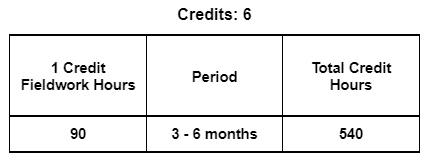1. COURSE DESCRIPTION
This course covers a number of tasks that are divided into two parts. The first part is the professional orientation which focuses on understanding the work environment of prospective employers and the job markets in general. After this, the students will be placed at the selected employers where they will apply their acquired knowledge, skills, and attitude in a real work environment. It is essential for the students to comply with the hosting organization’s requirements, to meet the Performance Objectives (POs), and to keep track of their training progression throughout the work placement period.
2. REASON FOR THE COURSE
Students must develop practical knowledge, skills, and attitudes in order to strengthen their positions in the market. They need an opportunity to apply the knowledge acquired in previous coursework in a real business setting. Therefore, program graduates will develop work-readiness skills and be familiar with the key factors for success in an accounting career.
3. STUDY HOURS

4. ROLE IN CURRICULUM

Prerequisites:
On successful completion of this course, students will be able to:
| Knowledge | Level of Learning |
Related PLO |
|---|---|---|
| dentify Ethics (CK1) Identify the ethical requirements of the work |
Understand | PIP2 |
| Describe Accounting Principles (CK2) Describe the accounting principles and concepts in accordance with the accounting standards. |
Understand | PC5 |
| Cognitive Skills | Level of Learning |
Related PLO |
| Prepare Accounting Reports (CC1) Prepare accounting reports requested by management. |
Create | PC5 |
| Record Business Transactions (CC2) Record business transactions and events using appropriate software |
Apply | PC5 |
| Communication, Information Technology, and Numerical Skills | Level of Learning |
Related PLO |
| Discuss with Management and Colleagues (CCIT1) Discuss with the management and colleagues how to improve business performance. |
Apply | PCIT3 |
| Interpersonal Skills and Responsibilities | Level of Learning |
Related PLO |
| Work Effectively (CIP1) Work effectively with the team to achieve departmental and organizational objectives. |
Characterize | PIP1 |
Grades will be determined based on the following assessments and score allocations:
| SKILL | Assessment | Skill Weighting for Grade | ||||
|---|---|---|---|---|---|---|
| Mentor | Supervisor | Peer | PE Report | |||
| Identify Ethics (CK1) | 50% | 50% | 10% | |||
| Describe Accounting Principles (CK2) | 100% | 10% | ||||
| Prepare Accounting Reports (CC1) | 50% | 50% | 25% | |||
| Record Business Transactions (CC2) | 50% | 50% | 25% | |||
| Discuss with Management and Colleagues (CCIT1) | 50% | 50% | 10% | |||
| Work Effectively (CIP1) | 25% | 30% | 45% | 20% | ||
Performance Objectives
Students are required to achieve a minimum of four performance objectives in total including all three interpersonal qualities and the core skills of performance objectives in acounting.
Students may achieve each performance objective by participating in the suggested activities or other similar activities related to the performance objectives by providing an explanation in the practical experience report.
The performance objectives are set out in interpersonal qualities and core skills as in Appendix 1.
To provide evidence of achieving performance objectives, students are required to request a confirmation letter from their supervisor with the attachment of the performance objectives that they have achieved during the job training.
| Report: | Personal Experience Report |
| Work Group: | Individual |
| Output format: | Performance Objective Matrix |
| Language: | English |
|
Description: |
Students will be required to produce a summarized report reflecting the experience obtained from the job training that satisfies the required performance objectives. As their training progresses, students should keep track of their experiences. At the end of the training, students will be required to write a report summarizing the experience in their own words in a performance objective matrix. The report should be clear and truthfully reflect the experience with examples provided. |
| Lesson Learning Outcomes |
Teaching (T), and |
|
|---|---|---|
| 1 |
Course Orientation
|
Lecture Question and Answer |
| 2-18 | On-Job training (All CLOs) | Apply knowledge |
ACCA Rule Book https://www.accaglobal.com/gb/en/about-us/regulation/ethics/acca-rulebook.html
ACCA Performance Objectives
https://www.accaglobal.com/vn/en/student/practical-experience-per/performance-objectives.html
Appendix 1 – Performance Objectives
Interpersonal Qualities
These are the important elements of interpersonal qualities that students must achieve. They are required to maintain a professional code of ethics, develop productive business relationships with stakeholders, and take initiative as a leader during work.
| Performance Objectives | Elements |
| Maintain a professional code of ethics |
|
| Develop productive business relationships |
|
| Apply leadership and self-development |
|
Core Skill
Accounting
This involves students in the process of recording and processing transactions and events using appropriate accounting systems, and reviewing and preparing financial statements in accordance with accounting standards and legislation. In addition, students are also able to take part in management accounting such as planning the business activities, controlling the performance, preparing and monitoring the budget, and making recommendations for improvement.
| Performance Objectives | Elements |
| Record and process transactions and events |
|
| Prepare external financial report |
|
| Plan and control performance |
|
| Monitor and report performance |
|